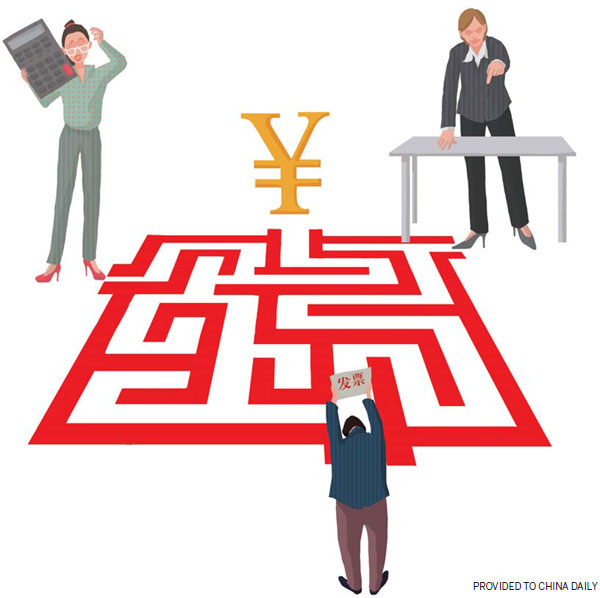Just the ticket for a happy customer


A guide to getting the documentation and money you are owed 在中国公司里,报销常常都是一个陷阱重重的闯关游戏
It is something everyone who is in China long enough eventually runs into. You come out of a subway station, and the entrance is blocked by middle-aged, furtive-looking women who scatter so that they will catch you in their web. When you come close enough, they glance sideways or stare at their shoes, murmuring in a listless voice only audible to you, "Fapiao, fapiao. Do you want fapiao? Real fapiao."
If you don't understand the word, you could be forgiven for thinking they were trying to sell you drugs, but what they are selling is less fun and probably more precious: the elusive invoice (发票 fāpiào).
A popular joke circulating online says Chinese are so obsessed with fapiao that in the red light districts of Europe, prostitutes lure in potential Chinese clients with the simple greeting, "Hello. We can give you fapiao. (你好,有发票。 Nǐhǎo, yǒu fāpiào.)" A joke though it is, there is a kernel of truth to it.
It is hard to overestimate the importance of the fapiao if you work in China. It is an important way for the Administration of Taxation to monitor a company's costs and revenue. Therefore, if you spend money on business matters and expect reimbursement (报销 bàoxiāo) from your company, you have to get the right invoice. However, most places will bend over backwards to keep you from ever getting a fapiao, so it is important to know a few tricks.
First, you need to know the difference between a fapiao and a receipt (收据 shōujù), a mistake expats in China can all too easily make. Often a receipt looks deceptively like a fapiao; the difference being that a fapiao has its own very particular stamp, 发票专用章 (fāpiào zhuānyòngzhāng). It is an oval-shaped red stamp that catchily says "standard invoice stamp nationwide" (全国统一发票监制章 Quánguó Tǒngyī Fāpiào Jiānzhì zhāng) in the upper line and "Supervised by State Administration of Taxation/Local Municipal Office of SAT" (国家/地方税务局监制) on the bottom line.
Fapiaos have various forms. Printed fapiao (机打发票 jīdǎ fāpiào), the most common, state the payer and the payee. To encourage people to ask for a fapiao (so the tax bureau does not lose money) many fapiao include a scratch prize (刮奖 guājiǎng) in the top right corner. Another kind of fapiao, a rarer one, is called a ripped fapiao (手撕发票 shǒusī fāpiào), which is pre-printed with fixed sums and is ripped off from its binding. No matter what they look like, make sure your fapiao has the SAT stamp.
Train and plane tickets are the exceptions. Train tickets are fapiao themselves, no stamp needed. However, with flights, the ticket is useless; you need to ask for a paper called 行程单 (xíngchéngdān) (literally itinerary sheet) from the airline office or your agency, which is also sanctioned by SAT as valid for reimbursement.
If you ask for fapiao after dining in a restaurant, the conversation often goes something like this:
Diner: I need a fapiao.
Wǒ xūyào fāpiào.
我需要发票。
Waitress: Here it is.
Zhè jiù shì.
这就是。
Diner: No, it doesn't have the fapiao stamp. It is just the receipt. What I need is a fapiao.
Zhè méiyǒu fāpiào zhuānyòngzhāng, zhǐshì shōujù ěryǐ. Wǒ yào de shì fāpiào.
这没有发票专用章,只是收据而已。我要的是发票。
Courtesy of the World of Chinese, www.theworldofchinese.com
The World of Chinese
(China Daily European Weekly 08/15/2014 page27)
Today's Top News
- PLA Daily: China resolute in winning anti-graft war
- Davos meet lays bare tensions and challenges
- Growth gaining traction amid upbeat outlook
- Bowl of laba serves as prelude to harmonious new beginnings
- Visit highlights cooperative nature of China-Europe ties: Editorial
- Placating bully with concessions 'fool's errand': China Daily editorial






























